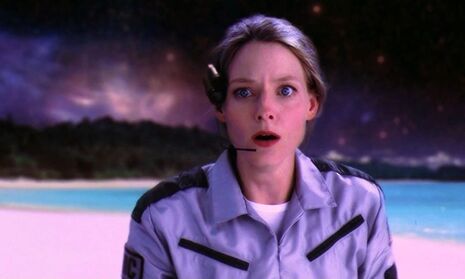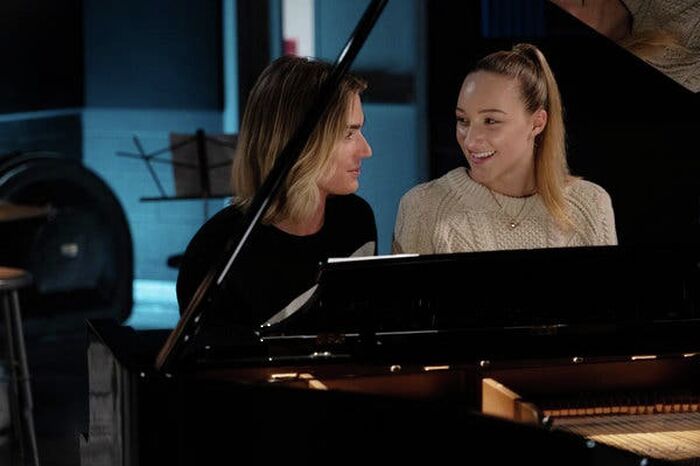The film that got me through first year
Ella Catherall explores the film that convinced her that she had a place in science, and sustained her through the stresses of Cambridge

I first watched Contact, a 1997 Robert Zemeckis masterpiece based on Carl Sagan’s novel of the same name, when one of my science teachers recommended it to me. The movie follows Dr Ellie Arroway (Jodie Foster), an astronomer who fights to justify her research into extraterrestrials, and deals with the consequences when she succeeds in detecting alien life. Contact is not a sad film, but I was in tears when it finished. Why I had this reaction is also the reason this film helped get me through my first year at Cambridge.
I idolise Ellie Arroway; she is my phone’s lock screen, I dressed up as her last Halloween and I try to emulate her whenever I can
The most obvious reason why this movie hit me so hard is that this was the first I’d seen where not only is the main character a female scientist... we get to see her actually doing science (groundbreaking, I know!). I idolise Ellie Arroway; she is my phone’s lock screen, I dressed up as her last Halloween and I try as hard as possible to emulate her whenever I can. She is a complex, well-written character who is not there just to be in a relationship with a male scientist. There is a random romantic subplot but Ellie’s relationship with Palmer Joss (Matthew McConaughey) never affects the decisions she makes about her research.
The existence of a fictional character like Ellie, someone who is in science and also looks like me, was massively empowering. My fictional role models before her were all guys and this made me feel like I was never going to truly belong in this field. Ellie Arroway helped me realise how flawed this idea was. I’m a white cis woman, and am aware of my privilege. There needs to be more scientists of colour and trans scientists in movies, so more people can feel seen and valued as I did.
During the film, you find out about Ellie’s incredible academic record, but she still has to sit in a desert for years without getting results, earning her the nickname ‘The High Priestess of the Desert’. She is undeniably intelligent, but she isn’t flawless. She makes mistakes regularly.
The image of a scientist as someone who constantly makes major breakthroughs is not only completely unrepresentative of what science is actually like, but as a science student, it means that any time you make a mistake, you feel like you have no way of ever living up to your scientific role models. Contact reminds me that I don’t need to be flawless to succeed. I still struggle with this, but having Contact remind me that my irrational brain is being irrational can be really helpful at times.
If you’re just doing science to be the best at it you’re doing it for the wrong reason
In short, Contact made me feel capable of doing science and also reminded me why I wanted to do science in the first place. I felt seen for the first time. Contact reminds me of my passion for science when I’m at the end of my tether with essays, but most importantly, it reminds me that my Tripos ranking does not inherently make me a good or bad scientist.
Obviously, you need to be good at science to be a good scientist but if you’re just doing science to be the best at it you’re doing it for the wrong reason. You have to be passionate about what you’re doing, you have to crave the thrill of discovery, and, in my mind, you have to want to change humanity for the better through your research. Because of this, Contact simultaneously reminds me that my ability to do this is not based on just one thing, and also makes me feel like, someday, I might be able to truly emulate Ellie Arroway and be part of impactful research like hers.
 News / Downing investigates ‘mysterious’ underground burial vault 29 December 2025
News / Downing investigates ‘mysterious’ underground burial vault 29 December 2025 News / Unions protest handling of redundancies at Epidemiology Unit30 December 2025
News / Unions protest handling of redundancies at Epidemiology Unit30 December 2025 Lifestyle / Ask Auntie Alice29 December 2025
Lifestyle / Ask Auntie Alice29 December 2025 Features / ‘Treated like we’re incompetent’: ents officers on college micromanagement30 December 2025
Features / ‘Treated like we’re incompetent’: ents officers on college micromanagement30 December 2025 Science / Astronomical events to look out for over the break29 December 2025
Science / Astronomical events to look out for over the break29 December 2025










